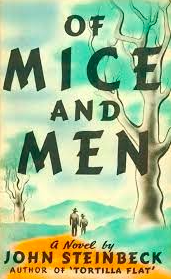
The novel Of Mice and Men, written by John Steinbeck, is one of the 20th century’s literary classics. It takes place in California during the sensitive time of America’s Great Depression and follows the evocative story of two companions who share a dream of tending a land of their own. It leads with a slow beginning as the author focuses on the characterization of the peripatetic pair, however, it finishes with a gripping end that provokes meditation on the value of life. There are hardly any elements signifying that the two will achieve their dreams, though their perseverance in such a desperate existence makes the story evermore endearing. Even if you don’t fancy stories involving racism, disablism, or sexism, Steinbeck created a sincere reflection of exclusivity in American culture, and therefore deserves the admiration for not shying away from exposing such flaws.
We are introduced to Lennie Small and George Milton, who share an almost mother and child-like relationship. Despite his burly stature and consistent perturbing of George, Lennie is good-natured, though mentally challenged. His counterpart is the complete opposite of Lennie in most forms; he is of small stature and short-tempered, except he too is upright. Unfortunately, George is burdened by Lennie’s incapabilities, but he continues to devote himself to the promise he made to his aunt–to look after Lennie. Even if their friendship was born out of obligation, the two share a brotherhood so strong that it prevails over hard times. They find work on a ranch after being driven out of their previous job due to Lennie’s irresponsible–yet harmless–actions. This is where the majority of the plot is set, and on this new farm, they continue to save up money to buy a share of land for themselves. Evenso, they are confronted by their ill-fated reality, and their aspirations have no room to be realized.
The cousins appear to be forbidden from accomplishing their goals, and as the audience reads deeper into the story, they learn that it is the bond between the two that restrains them. It seems that in such an age, people with challenges as Lennie has, along with those who support them, are rejected from attaining a satisfactory future. George and Lennie’s world was not very accepting of the mentally disabled, so neither of them could live the life they worked for together. There is no ending that allowed the both to live on well, a compromise of sorts had to be made so that at least one of them would continue on without hindrance from the other.
Sadly, bad things happen to good people, and occasionally sacrifices must be made to bring others peace. Hopefully these gloomy themes won’t discourage your interest in reading the novella, as it is rich in historical detail of the complexities of the working class in 1930’s America. How incredible that a book of brief nature is yet so solid with its many intricate themes, especially the display of the value in a steadfast friendship, even if it does not resolve with the happiest of endings.





